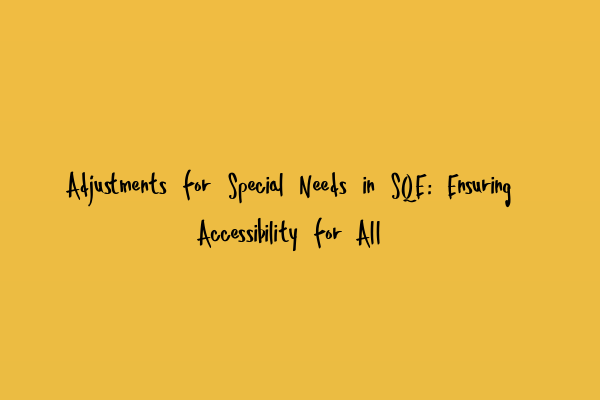Adjustments for Special Needs in SQE: Ensuring Accessibility for All
Welcome to our latest blog post, where we delve into the topic of adjustments for special needs in the Solicitors Qualifying Exam (SQE). As the legal profession strives to be more inclusive and diverse, it is crucial to address the accessibility requirements of individuals with special needs. In line with this commitment, the SQE is dedicated to providing equal opportunities to all candidates. This post aims to shed light on the adjustments available and how they ensure accessibility for every aspiring solicitor.
Understanding Special Needs in the Context of SQE
Before we delve deeper into the adjustments available, let’s understand what we mean by special needs in the context of the SQE. Special needs refer to any condition or requirement that may hinder a candidate’s ability to demonstrate their legal knowledge and skills effectively. This can include, but is not limited to, disabilities such as visual impairment, dyslexia, hearing loss, or physical disabilities.
Available Adjustments and Accommodations
The SQE acknowledges that every candidate should have an equal opportunity to succeed, regardless of their special needs. As a result, several adjustments and accommodations are available to ensure this level playing field. These adjustments may include:
- Extra time: Candidates with certain disabilities or conditions may require additional time to complete the exam. The SQE allows for reasonable adjustments in the form of extra time to ensure that candidates with disabilities can demonstrate their skills without being disadvantaged.
- Accessible formats: The exam materials can be made available in accessible formats such as large print, Braille, or electronic formats compatible with screen readers. This ensures that visually impaired candidates can access the exam content effectively.
- Assistive technology: Candidates may be allowed to use assistive technology, such as screen readers or speech recognition software, during the exam to accommodate their needs. This ensures that individuals with disabilities can effectively interact with the exam content and demonstrate their understanding.
- Alternative venues: The SQE is committed to providing accessible venues for candidates with physical disabilities. They work closely with exam centers to ensure that suitable facilities are available, such as ramps or elevators, to accommodate candidates’ mobility needs.
- Special requirements: Candidates with specific needs or requirements may be granted additional adjustments upon request. This includes individuals with hearing loss who may require sign language interpreters or candidates with dyslexia who may require extra support for reading and comprehension.
Applying for Adjustments
If you have special needs that require adjustments or accommodations for the SQE, it is important to apply for these adjustments well in advance. The application process usually involves providing supporting documentation, such as medical or educational reports, to demonstrate the need for the requested adjustments.
The SQE has a dedicated special needs team that reviews applications and determines the appropriate adjustments on a case-by-case basis. They ensure that all necessary adjustments are in place before the exam day to guarantee a fair and accessible testing environment for all candidates.
Conclusion
Ensuring accessibility for individuals with special needs is a vital aspect of creating a more inclusive legal profession. The SQE’s commitment to providing adjustments and accommodations for candidates with special needs reflects this dedication. By offering extra time, accessible formats, assistive technology, alternative venues, and other special requirements, the SQE ensures that all aspiring solicitors have equal opportunities to demonstrate their legal knowledge and skills successfully.
If you require adjustments for special needs in the SQE, it is essential to follow the application process outlined by the SQE and provide the necessary supporting documentation. By doing so, you can ensure that the exam environment is tailored to your needs, allowing you to showcase your abilities without any hindrance.
Remember, inclusivity and accessibility go hand in hand with a fair and diverse legal profession. The SQE’s adjustments for special needs play a crucial role in achieving these goals and ensuring equal opportunities for every aspiring solicitor.
We hope this blog post has provided a comprehensive overview of the adjustments available in the SQE and their significance in ensuring accessibility for all. For more information and guidance, we encourage you to visit the SQE’s official website or reach out to their dedicated special needs team.
Good luck with your SQE journey, and remember, your special needs should never hinder your dreams of becoming a successful solicitor!

Leave a Reply